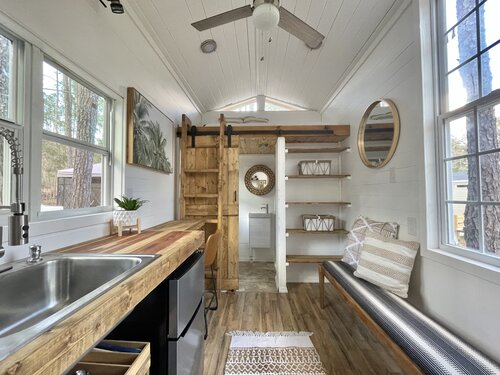20 Sep How You Can Start Saving Up for a Tiny House Even Before Graduating

Tiny homes have seen a surge in popularity in recent years. Business Insider’s report on tiny homes found that more than half of surveyed Americans would consider living in a tiny home, with 86% open to the idea of it being their first home. Due to their affordability and efficiency, it’s unsurprising why smaller homes have become a popular choice for many. Tiny homes are especially appealing for college students, who may already be struggling with finances.
With the continual rise in rent as reported by USA Today, students often struggle to find affordable housing alongside balancing other financial obligations. To avoid accumulating further debt, as many as 21% of students have chosen to move back to their parent’s homes, while 10% plan to compromise on their wants and needs to save money. Instead of investing in expensive traditional homes, college students are now looking into tiny homes, so they can have some independence once they graduate. Still, while tiny houses are significantly cheaper than traditional homes, the upfront costs for construction and furnishing can still be challenging to meet. Here are some tips college students can do to save up for a tiny house:
Set aside $10 a week for savings
College students often find themselves facing a lot of expenses as they prepare to graduate. Once you start looking for work and managing your student debt, it can be difficult to set aside money for your own home. As such, a post on investment tips for college students by Maryville University recommends that students should start small, with as little as $10 every week, because you don’t need thousands or even hundreds of dollars to start investing. By cutting out unnecessary expenses, you can instead save your extra cash to go towards building a tiny house. To maximize your $10, look for a bank that provides higher interest rates for their savings accounts. This can allow you to grow your money steadily.
Automate your savings
If it seems too difficult to tuck away $10 at the start of every week, automating contributions to your savings account can keep you within budget. Even if a part-time job helps increase your earnings, savings can still be lost if you’re always tempted to treat yourself and spend your hard-earned cash. Automating your cash flow towards saving can give you one less thing to worry about, and even prevent you from overspending. This can ensure you’re consistently saving a portion of your income for your tiny house fund, and even encourage you to build financial discipline.
Spend wisely on investments
Of course, if you’re interested in taking your money further, you can start researching brokerages and investment vehicles. One of the most popular options for beginner investors are index funds, such as the Standard & Poor’s 500 index of major US companies (S&P 500). As mentioned earlier, your initial investment doesn’t have to be big. The S&P 500 allows you to invest in a ready-made portfolio of low-risk stocks, without having to worry about individual stocks themselves. It’s important to note that you shouldn’t worry too much about the daily price fluctuations, and instead focus on growing the money in your investment portfolio until you need it for your tiny house purchase.
Learn how to budget
By mastering how to budget during your college years, you can have an overview of your financial expenditures and learn how to optimize your spending habits so you can work towards your savings goals. Not only would this benefit you while you’re still in school, but you can carry these good habits when you are already planning out your first home. As noted in our post “Tiny Savings Pay Off”, it’s still essential to spend wisely without sacrificing safety. Being equipped with the proper knowledge and discipline can help you build up a more financially stable future for yourself.
Article written by Rachel Jain
Exclusively for:


Sorry, the comment form is closed at this time.